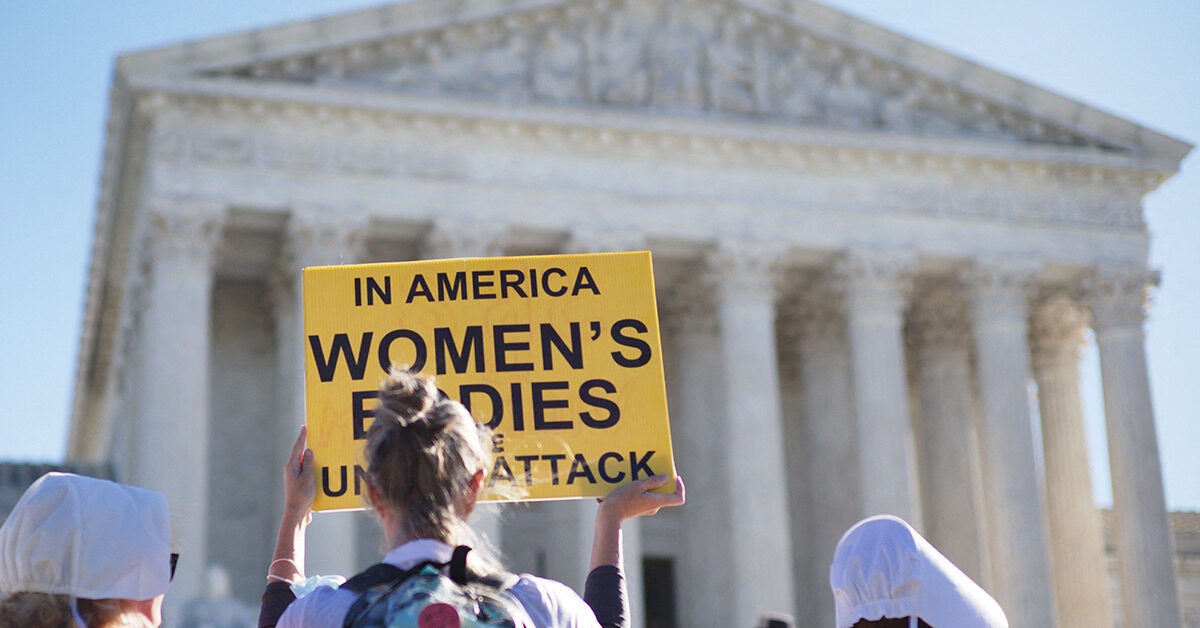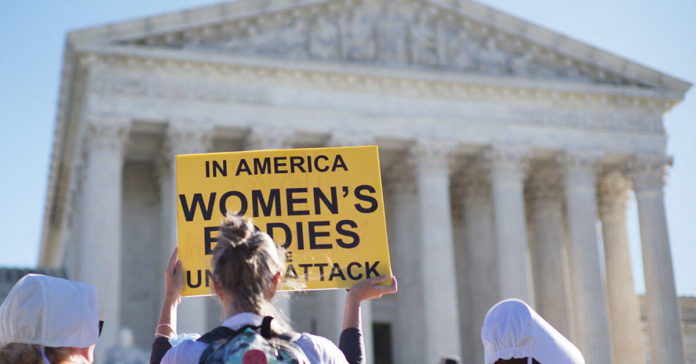
- S.B.8, the 6-week abortion ban in Texas, is headed to the Supreme Court today.
- The law is the most restrictive in the nation.
- Legal experts predict the Court will provide an answer by Thanksgiving, though the exact timeline is unknown.
The Texas law banning abortion after fetal cardiac activity is detected, known as S.B.8, is headed to the Supreme Court on Monday. The justices will hear oral arguments for two cases challenging the law.
The Supreme Court must answer two fundamental questions from the cases — Whole Woman’s Health v. Jackson and United States v. Texas — over S.B.8, which gives private citizens the power to sue people who perform abortions or help pregnant people access abortions.
The first question involves whether the federal government can sue Texas over S.B.8 and protect people’s constitutional rights. The second question asks whether a state can allow a private citizen to limit another’s constitutional right through civil action.
Oral arguments start today, and legal experts predict the Court will have a decision by Thanksgiving.
S.B.8 allows private citizens to sue (for a minimum of $10,000) any individual who performs an abortion or helps a pregnant person get an abortion after 6 weeks of pregnancy.
According to Nicholas Creel, an assistant professor of business law at Georgia College and State University who specializes in constitutional law, though Roe v. Wade gets the most attention when it comes to abortion law, Planned Parenthood v. Casey is the most relevant precedent.
With this case, “it was established that a state could not put an ‘undue burden’ on a woman seeking an abortion prior to the point of ‘fetal viability,’ Creel told Healthline.
Six weeks of pregnancy is well before the point of
“S.B.8, effectively banning abortions at 6 weeks, pretty clearly places a substantial burden on women seeking abortions well prior to the point of fetal viability,” Creel said.
On Monday, November 1, the Supreme Court will hear oral arguments for two cases challenging the ban: Whole Woman’s Health v. Jackson and United States v. Texas.
According to Blake Rocap, a healthcare attorney and legislative counsel for abortion advocacy firm Avow Texas, the Court will have to answer two fundamental questions.
The first question, which will be addressed via United States v. Texas, is whether the federal government could legally sue Texas over S.B.8 to overturn the law and protect its citizens’ constitutional rights.
“If the state sets up a system that violates people’s rights, but they themselves aren’t enforcing it and there’s no specific state actor, can the United States sue the state as a whole to protect people’s constitutional rights,” Rocap said.
According to Creel, the Court must answer yes to this first question in order to proceed to the second question.
The second question is whether a state can allow the public to threaten a person from exercising their constitutional rights through civil action.
“This is what I think will ultimately be what the Court uses to declare S.B.8 unconstitutional,” Creel said.
Rocap is keeping an eye on how the justices will reconcile their competing interests — i.e., being concerned with overreaching power of government while acknowledging Texas has deprived people of their constitutional rights.
If the Court upholds S.B.8 and decides states can enact laws that clearly violate people’s constitutional rights, and if federal courts cannot successfully intervene to protect people’s constitutional rights, then that would be a departure from the level of authority the federal courts have had over the past 200 years, Rocap said.
Rocap said that type of decision would then threaten many other rights people take for granted, like contraception, gay marriage, interracial marriage, and women’s rights.
Because the Court will review the constitutionality of people’s right to access an abortion, Creel expects the more conservative justices to join the liberal justices in a vote that overturns S.B.8.
Creel suspects, given the expedited timeline so far, that there will be a decision on the two questions by Thanksgiving. Ultimately, though, the timeline is unknown.
“No one knows how fast or how slow they are going to move,” Rocap said.
S.B.8, the 6-week abortion ban in Texas, is headed to the Supreme Court on Monday. The Court is hearing oral arguments regarding two cases challenging the ban.
The cases introduce two fundamental questions that the justices must answer: whether the federal government can sue Texas over S.B.8 and protect people’s constitutional rights, and whether the state can allow private citizens to limit people’s constitutional rights through civil action.
Legal experts predict the Court will provide an answer by Thanksgiving, though the exact timeline is unknown.



